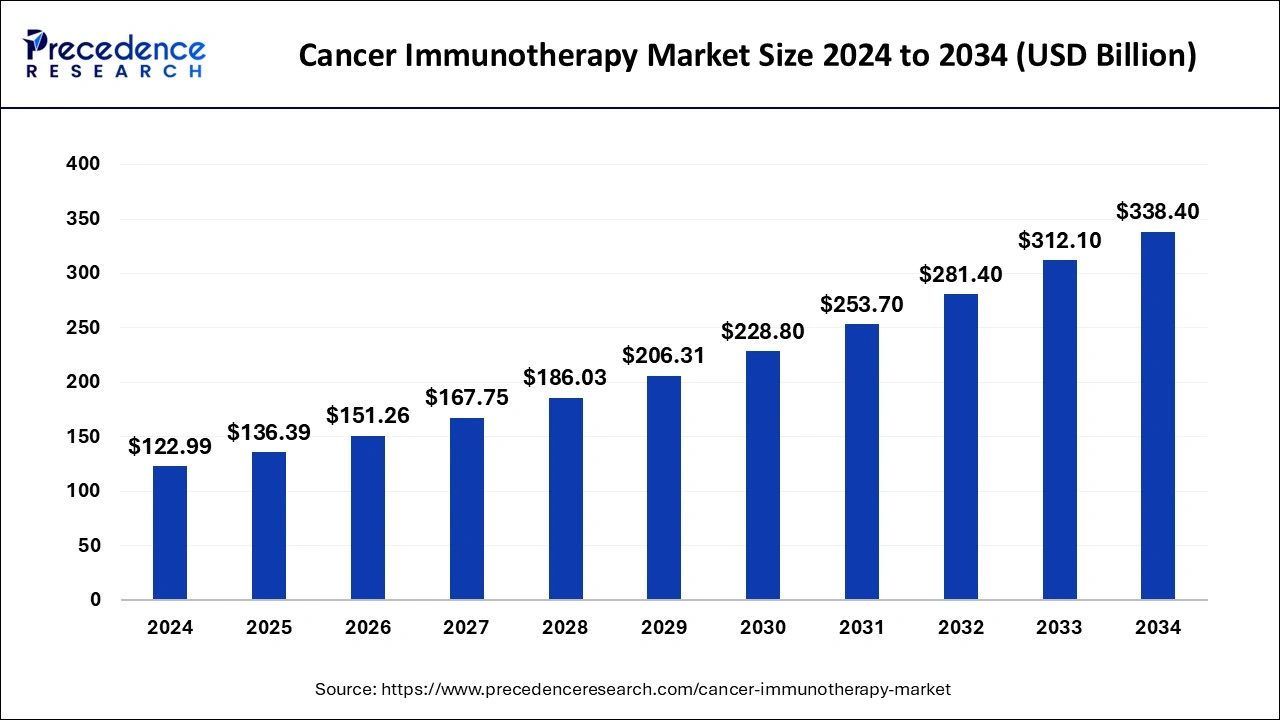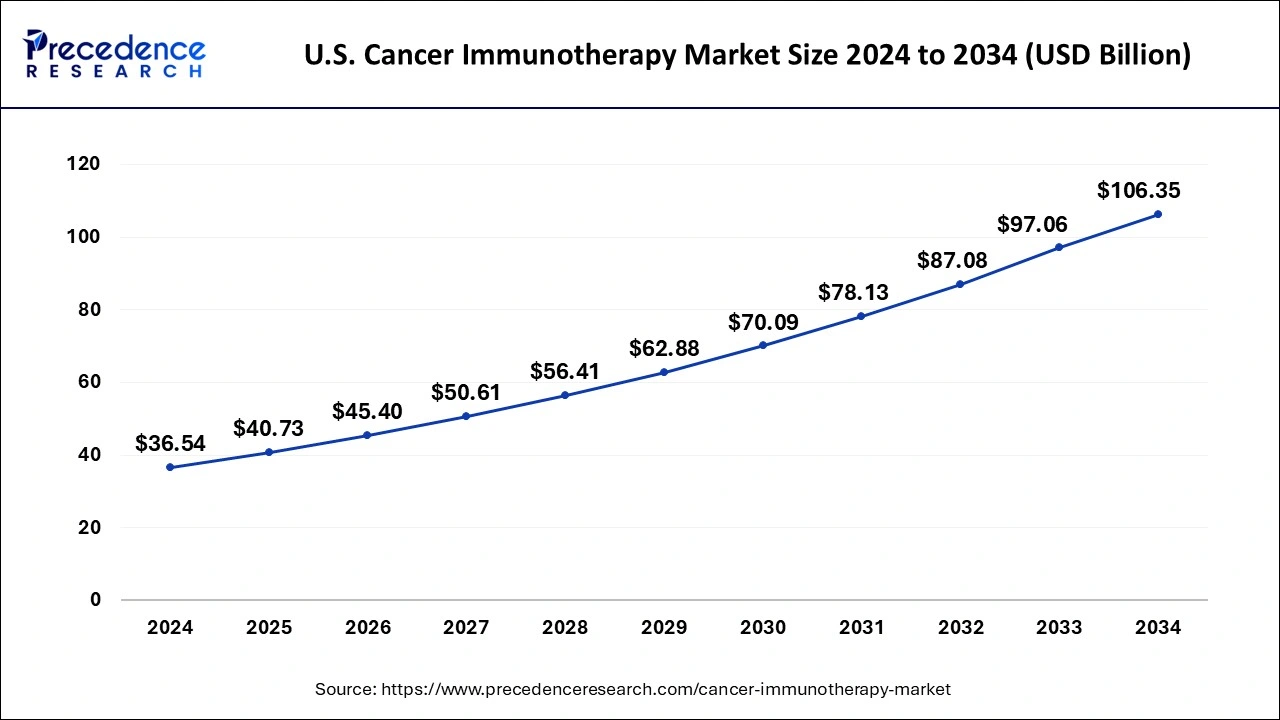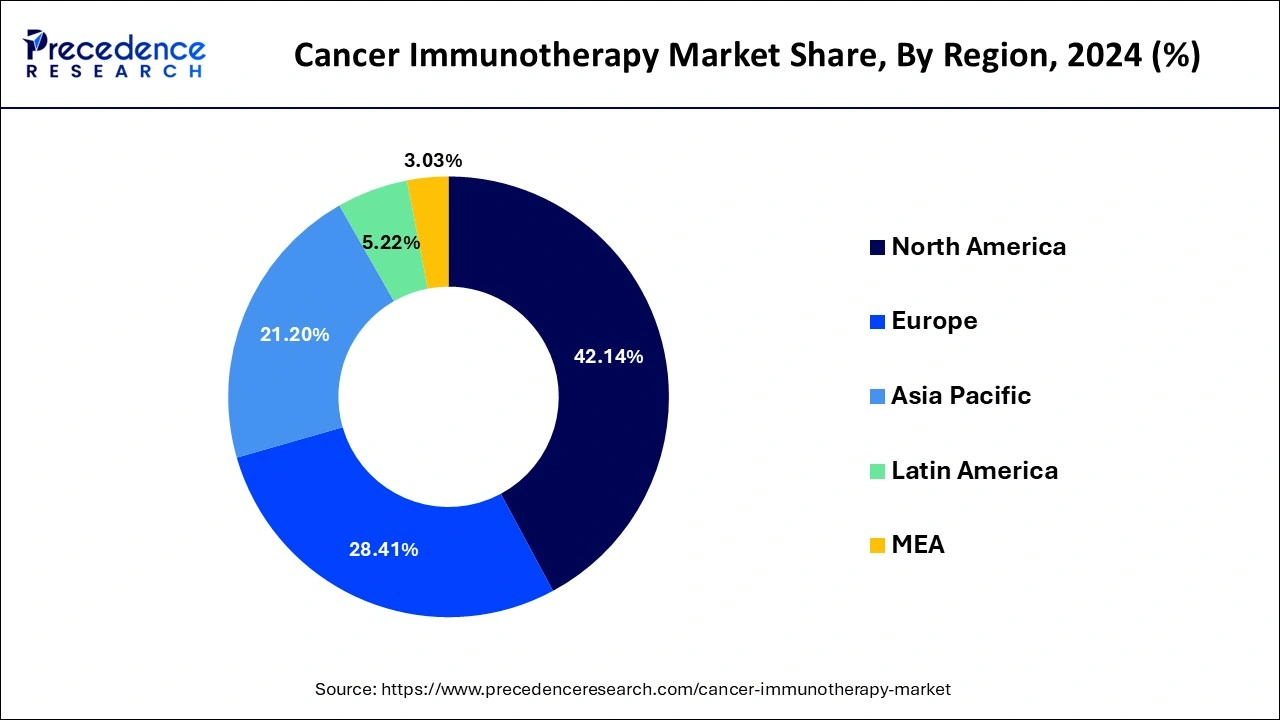January 2025
The global cancer immunotherapy market size is calculated at USD 136.39 billion in 2025 and is forecasted to reach around USD 338.40 billion by 2034, accelerating at a CAGR of 10.65% from 2025 to 2034. The North America cancer immunotherapy market size surpassed USD 51.83 billion in 2024 and is expanding at a CAGR of 10.68% during the forecast period. The market sizing and forecasts are revenue-based (USD Million/Billion), with 2024 as the base year.
The global cancer immunotherapy market size was accounted for USD 122.99 billion in 2024, and is expected to reach around USD 338.40 billion by 2034, expanding at a CAGR of 10.65% from 2025 to 2034. The rising number of approvals by regulatory agencies for novel immunotherapies is anticipated to further help the growth of cancer immunotherapy market.

Artificial Intelligence (AI) can be big boost for the cancer immunotherapy market in the coming years. AI has different applications that will help with various process of cancer immunotherapy treatment. Generative AI can be used for the development of mRNA-based cancer vaccines that are personalized. With generative AI, the development of superior mRNA molecules by uncovering potential sequence patterns as well as structure is possible. These AI based models will be able to provide an effective strategy for the designing on mRNA. Another benefit of utilizing AI is speeding up the drug discovery process for cancer. AI and machine learning (ML) model can run through numerous variations and analyze combinations that match while eliminating the rest. This gives researchers an edge in development of drug discovery by speeding up the process. There is plenty of scope for AI applications in the cancer immunotherapy market.
The U.S. cancer immunotherapy market size was estimated at USD 36.54 billion in 2024 and is predicted to be worth around USD 106.35 billion by 2034, at a CAGR of 11.27% from 2025 to 2034.

North America dominated the global cancer immunotherapy market in 2024, in terms of revenue and is estimated to sustain its dominance during the forecast period. This can be attributed to the increased prevalence of cancer in the region coupled with the increased adoption of the cancer immunotherapy among the population. According to the American Cancer Society, over 1.8 million new cancer cases and 606,520 deaths were reported in the US in 2020. The lungs cancer, colorectal cancer, breast cancer, and prostate cancer are the top four cancers that prevails in the US. However, owing to the increased adoption of the cancer therapies in the region, the number of cancer deaths has declined by 29% since 1991.
On the other hand, Europe is estimated to be the most opportunistic market during the forecast period. This is due to the rising number of cancer cases and cancer deaths across Europe. According to the European Commission, around 2.7 million new cancer cases and around 1.3 million cancer deaths were reported in 2020. The geriatric population of aged 65 years or above were the most affected by cancer in Europe. Breast cancer has been recorded as the most diagnosed cancers across the European countries in 2023.

Cancer immunotherapy drugs are specifically created for boosting or altering human’s body’s natural immune response to fight diseases. This therapy is completely driven by research and developments efforts. Innovations by researchers and investment in research and developments have contributed to growth of the cancer immunotherapy market. The rising number of people and medical professionals opting for immunotherapy is rising day by day, helping the expansion of this market. This therapy is becoming a popular choice because it is cost-effective and has considerably less side effects from the treatments. Most key players are focusing on research and development activities to come up with novel treatments to help patients with cancer. These factors will drive the growth of cancer immunotherapy market in the forecast period.
| Report Highlights | Details |
| Market Size in 2025 | USD 136.39 Billion |
| Market Size by 2034 | USD 338.40 Billion |
| Growth Rate from 2025 to 2034 | CAGR of 10.65% |
| Largest Market | North America |
| Base Year | 2024 |
| Forecast Period | 2025 to 2034 |
| Segments Covered | Technology, Cancer Type, and End User |
| Regions Covered | North America, Europe, Asia-Pacific, Latin America, and Middle East & Africa |
Rising cases of cancer
There is a noticeable increase in cases of cancer across the world. According to International Agency for Research on Cancer, in 2020, the number of cases were around 19.29 million and they estimate that in a decade by 2030, the number of cases will go up to 24.58 million. The change in lifestyle, rising ageing population combined with hereditary cancer cases rising are pushing the cancer cases up every passing year. This factor is a major driver for the cancer immunotherapy market and will continue to push market growth in the coming years.
Innovation
For this market, innovation is the key. It is only possible through research and development activities. The global cancer immune therapy market has already experienced a certain level of innovation and unique developments. The investments in research and development activities by key players have already made substantial progress with advancement in targeted therapies, customized treatments based on genetic profiles, precision medicine. These treatments offer different ways of helping patients fight cancer. In the forecast period, they key to further drive innovation is for major players to look for collaborations, acquisitions, partnerships etc. that can open up new avenues and geographical markets.
Based on the technology, the monoclonal antibodies segment dominated the global cancer immunotherapy market in 2024, in terms of revenue and is estimated to sustain its dominance during the forecast period. The monoclonal antibodies are efficient in targeting the specific cancer affected cells and treats that particular cell without harming the normal cells. Therefore, it is considered safer and has low toxicity as compared to that of the chemotherapy. The low toxicity and low side-effects of the monoclonal antibodies is boosting its demand among the cancer patients. Further, a total 73 monoclonal antibodies has been approved by the end of 2017, by EMA and FDA.
On the other hand, the checkpoint inhibitors are estimated to be the fastest-growing segment during the forecast period. This can be attributed to the rising adoption of the checkpoint inhibitors in the treatment of the cancer. The development strategies adopted by the market players like collaborations for the research and development of the checkpoint inhibitors is expected to drive the demand for the checkpoint inhibitors during the forecast period.
Based on the application, the lungs cancer segment dominated the global cancer immunotherapy market in 2024, in terms of revenue and is estimated to sustain its dominance during the forecast period. This is simply attributed to the increased prevalence of lungs cancer among the global population. According to the International Agency for Research on Cancer, lungs cancer is the leading cause of cancer death across the globe. Around 1.8 million deaths were reported in 2020 due to the lungs cancer. It accounts for 18% of the global cancer deaths.
On the other hand, the breast cancer segment is estimated to be the fastest-growing segment during the forecast period. This can be attributed to the rapidly growing cases of breast cancer among the global women population. According to the International Agency for Cancer Research, breast cancer had surpassed the lungs cancer, by becoming the most diagnosed type of cancer. There were around 2.3 million or 11.7% of the new cancer cases reported as the breast cancer in 2020. Hence, this segment is expected to grow rapidly in the forthcoming years.
Based on the end user, the hospitals segment dominated the global cancer immunotherapy market in 2024, in terms of revenue and is estimated to sustain its dominance during the forecast period. This can be attributed to the increased number of hospital admission related to the treatment of cancer. Furthermore, the increased number of government and private hospitals in across the globe is the first preference of the patients to receive treatment for various types of cancer. The rising penetration of hospitals across the globe along with the rising adoption of the latest treatment technologies is expected to further drive the growth of this segment.
On the other hand, the cancer research institutions is estimated to be the most opportunistic segment during the forecast period. The rising corporate and government investments in the research and development of the cancer treatment therapies and research activities on the immunotherapies is expected to drive the growth of this segment in the upcoming future.
By Technology Type
By Cancer Type
By End User
By Distribution Channel
By Geography
For inquiries regarding discounts, bulk purchases, or customization requests, please contact us at sales@precedenceresearch.com
No cookie-cutter, only authentic analysis – take the 1st step to become a Precedence Research client
January 2025
May 2025
September 2024
October 2024